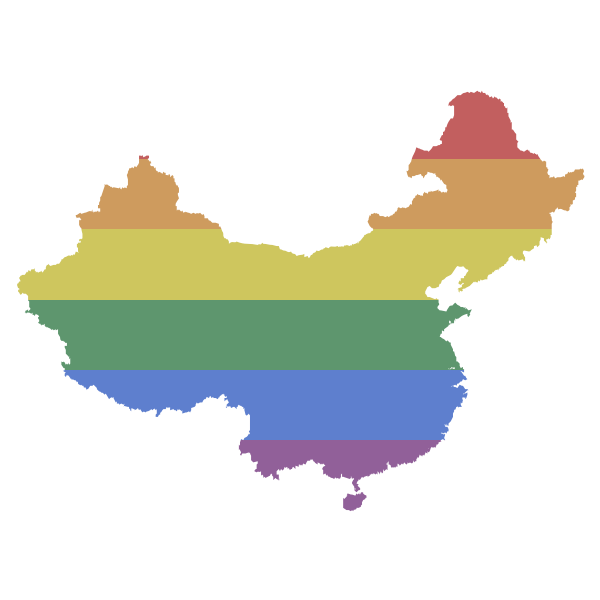- Homosexuality
- ⚢✔ Legal
- Gay Marriage
- ⚭✖ Other type of partnership
- Censorship
- ✖ State-enforced
- Changing Gender
- ✖ Legal, but requires surgery
- Gender-Affirming Care
- ✖ Restricted
- Non-Binary Gender Recognition
- ✖ Not legally recognized
- Hate Crime Protections
- ✖ No protections
- Discrimination
- ✖ No protections
- Employment Discrimination
- ✖ No protections
- Housing Discrimination
- ✖ No protections
- Adoption
- ✖ Single only
- Intersex Infant Surgery
- ✖ Not banned
- Military
- Ambiguous
- Donating Blood
- ✖ Banned (indefinite deferral)
- Conversion Therapy
- ✖ Not banned
- Age of Consent
- ✔ Equal
Public Opinion
Recent surveys in China indicate a moderate level of acceptance for LGBTQ+ rights in specific areas.
I believe that everyone, including members of [the LGBTQ], should be treated fairly in the workplace
I believe that schools should protect all students, including those from [the LGBTQ], from bullying and violence
I don’t mind seeing content related to [the LGBTQ] in media reports, movies, or social media
Perception of LGBTQ+ People
Survey results from 23 LGBTQ+ Equaldex users who lived in or visited China.
Overall
Perceived Safety**Survey results represent personal perceptions of safety and may not be indicative of current actual conditions.
Equal Treatment
Visibility & Representation
Culture
Services
History
Homosexual activity in China is legal.
Same-sex marriage in China is other type of partnership.
Censorship of LGBT issues in China is state-enforced.
A Chinese broadcaster, Mango TV, which broadcasts Eurovision blurred a rainbow flag during the semi-final of the show.
In April of 2022, a few lines of dialog were removed from the Chinese release of the film 'Fantastic Beasts: The Secrets of Dumbledore.' The dialog referenced the gay romance between Albus Dumbledore and Gellert Grindelwald.
In August of 2023, Chinese officials removed an LGBTQ song from the set list of popular Taiwanese pop star A-Mei, ahead of her concert in Beijing. Security guards at the event forced fans to remove rainbow symbols and clothing. On the 22nd of August, Chinese officials shut down a handful of popular social media accounts on the Chinese social networking service WeChat.
Right to change legal gender in China is legal, but requires surgery.
Gender-affirming care in China is restricted.
- Must have been diagnosed with gender dysphoria
- Must have continually demanded GRS for at least five years
- Must have no criminal record
- Must not be married
In 2021, China's first clinic for transgender children and adolescents was set up at the Children's Hospital of Fudan University in Shanghai to safely and healthily manage transgender minors' transition. As of 2025, there are 7 medical centers that provide treatment to transgender people in China and 3 of those offer puberty suppression as a treatment option for trans youth.
Legal recognition of non-binary gender in China is not legally recognized.
Hate crime protections in China is no protections.
LGBT discrimination in China is no protections.
LGBT employment discrimination in China is no protections.
In January 2020, a transgender person emerged victorious in a lawsuit against workplace discrimination. However, the ruling only applies to this specific case.
LGBT housing discrimination in China is no protections.
Same-sex adoption in China is single only.
Intersex infant surgery in China is not banned.
There are reports that such surgeries are widespread, often performed in secret due to social stigma.
Serving openly in military in China is ambiguous.
Blood donations by MSMs in China is banned (indefinite deferral).
Conversion therapy in China is not banned.
LGBT Rights by Province
View the LGBT laws in each individual province of China.
- Guangxi (Autonomous Region)
- Nei Mongol (Autonomous Region)
- Ningxia (Autonomous Region)
- Tibet (Autonomous Region)
- Xinjiang (Autonomous Region)
- Beijing (Municipality)
- Chongqing (Municipality)
- Shanghai (Municipality)
- Tianjin (Municipality)
- Aomen (Special Administrative Region)







